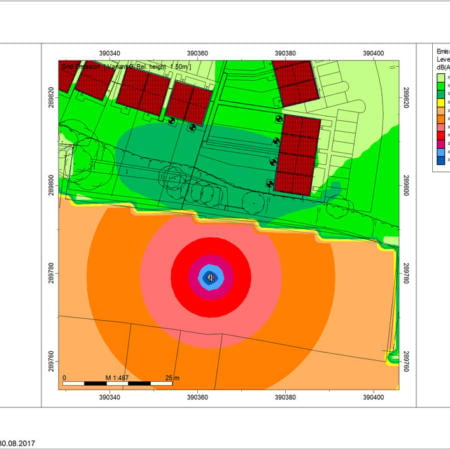
Proudly offering nationwide surveys and shipping for the UK
Call: 01473 396 332 Email: [email protected]
Request a call backSound Solution Consultants (SSC) can provide businesses with entertainment noise assessments and advice. Assisting with the operation of premises and events in noise sensitive areas. Where an investigation determines that sound is at a level which can readily cause an adverse effect. For example, a complaint or disturbance. Then issue appropriate mitigation to comply with relevant codes, guidance or other criteria.
We have successfully assisted several venues across England in overcoming noise abatement notices. Where statutory nuisance has been witnessed to exist.
The types of premises that can be considered under the title of entertainment noise, covering the leisure, entertainment and performing arts assessment can include:
SSC normally assesses the breakout or propagation of sound from an existing or proposed premise, relevant to noise sensitive receptors nearby. The relevant guidance to follow in these instances stems from the Good Practice Guide for Control of Noise from Pubs & Clubs as published by the Institute of Acoustics (IOA).
Often, the assistance of these venues is not reliant upon numerical assessment of the venue. But the subjective impression (e.g. whether the sound is audible and/or discernible). Care is required in the planning of new venues to ensure that significant adverse impacts will be avoided.
The common problems associated with entertainment venues are readily described as follows:
Often, alongside to any technical audio or building improvements that can be adopted. SSC promote the use of noise management plans when dealing with entertainment noise issues.
There are a range of outdoor sporting activities that could require assistance from an acoustic consultant. For example, clay pigeon shooting, and motocross. These both have relevant guidance to assist with ensuring acceptable levels of environmental impact. The impact of external sporting activites is usually assessed at nearby dwellings and sensitive receiver spaces.
Gymnasia and bowling alleys can present problems that concern both noise and vibration. The dropping of heavy weights or bowling balls can cause buildings to shake and potentially disturb nearby dwellings; particularly if they are structurally attached.
Gymnasium Noise and Vibration Case Study
Festival and event organisers, as well as Local Authority Environmental Health Practitioners, will often place noise as a primary concern for outdoor music festivals. Acoustic design assistance should be taken at the planning stage of such proposals to ensure that the event is viable and that the event sound levels can be optimised.
The Noise Council Code of Practice on Environmental Noise Control at concerts remains as a quantitative measure for both event organisers and sound engineers. The Code provides limits for outdoor music events, based on the frequency and type of event, at nearby dwellings.
A scheme of sound monitoring is normally undertaken during and outdoor music events assessed under the Code of Practice to evaluate compliance with the noise criteria. SSC can work with stage managers and sound engineers to ensure that the sound levels are optimised on-stage, to remain within set limits or licensing criteria off-site.
Internal sound levels from large venues, including stadia, theatres and concert halls, are normally very high such that the breakout to noise sensitive receptors nearby must be controlled. The common problems (above) associated with entertainment venues are also relevant to these building types.
The internal acoustics of these spaces is also important to deliver suitably enveloping sound across the audience areas where room acoustic modelling is often used.
Call: 01473 396 332 Email: [email protected]
Request a call back